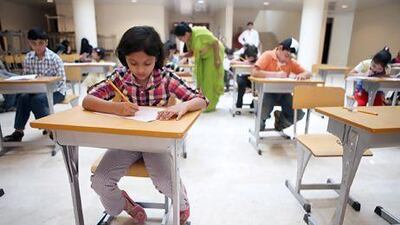A jump in the cost of education contributed to a slight increase in inflation in the country.
The Emirates consumer price index hit 117.38 last month - representing an increase of around 1 per cent compared with March 2012, according to the National Bureau of Statistics (NBS).
However, the cost of education rose by almost 6 per cent since March of last year, according to official figures.
The cost of schooling children in the UAE can be considerable, with some operators, such as Repton School in Dubai, charging Dh46,325 (US$12,613) annually for nursery pupils, and up to Dh92,650 for year 12 and year 13 students, according to its website.
But not all schools are profitable.
Westminster School in Dubai, a private school operated by Gems Education, tabled a proposal to the Knowledge and Human Development Authority, Dubai's private schools regulator, to help to keep it open.
The school was due to close by next year after Gems said it could not afford to run the facility for annual tuition fees of Dh10,000 a student. It has only been allowed to increase its fees by 3 per cent after receiving an "acceptable" ranking for the past four years of Dubai Schools Inspection Bureau evaluations.
Gems has said its data did not correspond with the Dubai Statistics Centre's inflation rate, which claimed there was disinflation in the education sector this year.
"In 2012 alone, we increased wages across all our schools by a range of 5 to 10 per cent," a spokesman for Gems told The National last week. "We have also seen increases in rent and utilities."
According to the consumer price index, education was not the only cost to rise,
Food and soft drinks rose 2.15 per cent year on year, and restaurants and hotels were 4.33 per cent more expensive. But the largest rise was in beverages and tobacco, which were up 17.15 per cent.
There were small falls in the cost of housing year on year at 0.11 per cent, textiles, clothing and footwear at 0.05 per cent and miscellaneous goods and services, which dropped 0.35 per cent.
A number of categories showed rises month on month in March, when inflation stood at 0.12 per cent higher than in February.
Housing services climbed by 0.15 per cent, while rent was up 0.17 per cent.
Some of the largest rises were in food, which make up nearly 14 per cent of the basket. Fruit was 4.8 per cent more expensive month on month, while the cost of tea, coffee and cocoa climbed 3.47 per cent in the period.
Inflation rose across the Emirates in March in varying degrees.
It was highest in Abu Dhabi at 0.24 per cent.
Sharjah and Umm Al Quwain were joint second at 0.20 per cent. In Ajman, inflation stood at 0.12 per cent. The smallest rises were seen in Dubai, where it climbed 0.06 per cent, Fujairah, where it rose 0.03 per cent and Ras Al Khaimah, which registered a rise of just 0.02 per cent.
The figures continue a trend in the past two years where consumer price rises remained in negative territory or bumped along the zero line.
Data from the UAE Ministry of Economy indicated the consumer price index increased by 0.6 per cent last year, while figures from the IMF indicated it was slightly higher at 0.98 per cent. However, the margin was so small as to be negligible.
Analysts do not expect it to last, however, with many predicting the pace of inflation will quicken this year.
"I think most of the suggestions are based on the fact that house prices, and particularly rent, are seen as an increasing," said Richard Adams, the director and senior consultant at Acuity Middle East. "What you saw last year in the official numbers was quite a significant decline of about 5 per cent roughly in house price inflation. The turnaround of that is seen by most people as [responsible for creating] some inflation going forward," he added.
The booming hospitality and retail sectors could also drive consumer prices higher if hotel occupancy surges and rising visitor numbers ease pressure on retailers to discount.
A report from Emirates NBD in January said inflation was forecast to reach 2.5 per cent this year.
Analysts polled by Reuters in January forecast the number to be slightly lower, predicting average inflation of 1.8 per cent in 2013 from 0.7 per cent in 2012, which was the lowest level since 1990.


